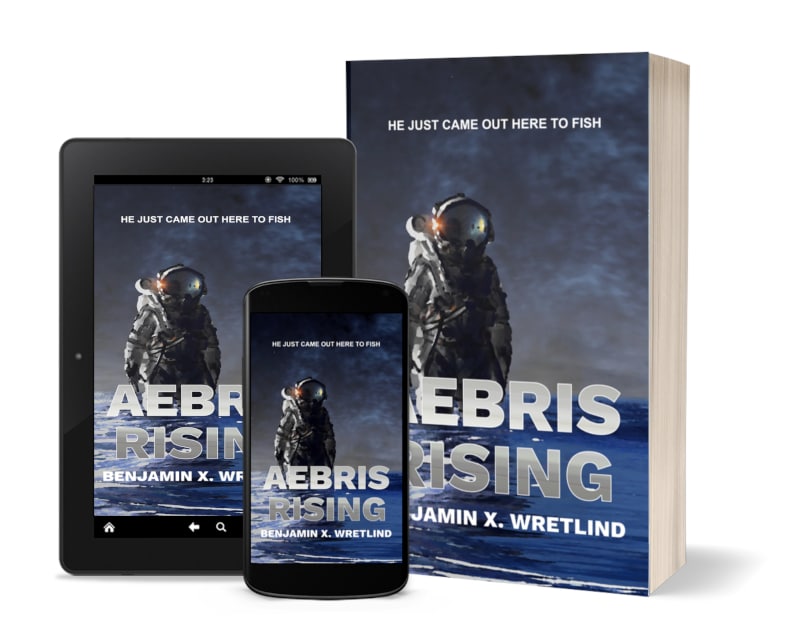The following excerpt is from Out of Due Season: The First Transit, which was released on February 8, 2022.
CHAPTER TWO (Continued)
Zachary felt a burning nervousness in his stomach which had less to do with the dive or the blackwater and more to do with what he hoped he would not find. It was almost like waiting for a zombie to jump out from around a corner in a game he once played as a kid. No matter how many times he played the game or how many times he had been attacked at the same corner, he still jumped.
The plan was to drop next to the marker farthest west and find the mini-mother and mast already dropped as an anchor point for the circular search pattern. The twenty-five-pound base weight would hold their search line as the two swam in an ever-increasing circular pattern looking for more bodies. When they found one, Zachary would clip a marker buoy to something solid—which meant something other than flesh—twist the marker and set it free. A blinking LED light would make visibility clearer from the shore and aid in the recovery efforts to come later. Zachary already dreaded that part of the mission. Maybe finding the bodies would not be as bad as trying to stuff them into a body bag and lifting them to the surface. It might be easier to just drain the lake.
Stuart pulled on the buddy line once and Zachary turned his direction. They were only three feet apart, and the farther they descended, the lower the visibility dropped. Zachary made out the green light stick clipped to Stuart’s suit, and he had to admit it was comforting to see. It meant he was not alone.
Stuart pointed down and then put up two fingers. They had about twenty more feet to go before they were on the bottom, and both divers needed to be careful not to stir up silt. As Zachary turned his head down toward the goal he made out the neon green line tied to the marker buoy up top and a victim on the bottom. Once they reached the victim, the two would turn west, travel thirty feet and tie off their line. At that point, the circular search would begin.
After slowing the descent, a shapeless blob took shape below Zachary. He stopped moving and pulled once on the buddy line. Although the shape was unclear, he knew exactly what it was and did not want to swim into it for any reason. In an almost unconscious move, Zachary adjusted his buoyancy compensator to maintain a neutral position in the water as Stuart swam closer.
The skin of the victim had loosened, and in the glow of the marine light through the darkened water, it took on a gray-green hue. The victim’s face pointed toward the surface as if gasping for air one last time, tongue puffed out like a tumor and eyes bulging. It was all an effect of the body bloating with gasses and wanting to rise while the weighted shoes kept it rooted. The arms floated free, and as Zachary moved his light over one hand, he saw the fingernails had already separated from the body. He knew from enough extensive training on body recovery that this was normal after two to three weeks, but it also meant he was now swimming near a body undergoing intensive putrefaction. An errant bump would hasten the process and a sudden intake of water meant he would ingest decaying flesh.
Stuart pulled on the buddy line, but Zachary’s eyes were glued to the sight in front of him. Here was a body—once a living, sentient creature with hopes and dreams and fears and failures—now decomposing at the bottom of a lake in the middle of nowhere for reasons unknown to anyone but its ghost and the ghosts around. It was like the old cliché: a train wreck. He was a rubbernecker witnessing a beautiful disaster, eyes frozen and suddenly disconnected from reality. It was both disastrous and hard to look away. When he had pulled the body from the river, it was nothing like this. The boy had drowned in a foot of water after being knocked unconscious in a fall. For a few weeks after the recovery, Zachary saw the kid’s face in dreams, in the store, everywhere he looked. But the body was not dissolving; rather, it was cold and rubbery, in a stage of postmortem lividity prior to severe discoloration and bloating. The boy could be moved, placed in a body bag with relative ease.
But this? This would be like putting soup into a freezer bag with chopsticks.
Stuart pulled again, and this time Zachary turned his face. His partner was a foot from him, and he saw through the face mask that he was not happy with something—either the scene or Zachary’s reaction to the scene. It was likely the latter, and with a growing sickness in his stomach and forced refusal to look at the body again, he gave an okay sign with his thumb and forefinger and then pointed to the west toward where they expected the find the mini-mother.
They swam about thirty feet to the west, approximately six feet above the bottom of the lake and with less than rigorous flipper kicks. The darkness was confining, and it would be easy to lose track of up versus down in a panic. The direction of the bubbles helped, and if Zachary became disoriented, he could reach up and grab the tether for comfort. It was a common hazard of diving in blackwater: up was down and sometimes left or right. It took concentration to remember where the surface of the water was, and even being close to something on the bottom did not necessarily help convince the brain all was well. On more than one occasion, he—and many other divers—had lost their orientation and hyperventilated. Training in blackwater helped, but it was a hazard that would never go away. Stuart, as Zachary had often noted, appeared to have no problem with blackwater, but if he did, there was little doubt the old geezer would hide it.
They reached the mini-mother, and the two clipped a search line to the mast. Anchored together by a buddy line, the search would be much slower, but Zachary took the outside, leaving Stuart to find what he missed on the first pass. When they completed what seemed like a circle, they would let out five more feet of search line and do it all over again until a good twenty feet had been combed over. Zachary found himself hopeful they would not find another body. A boat, sure. And coming up on a body when traveling through blackwater meant not seeing it until the last moment. If you did not stop in time, you might dislodge some flesh.
Which is exactly what happened on the third pass. Zachary had become more confident in their routine, kicking as necessary and keeping time with Stuart. The light illuminated little, and other than a fish that swam in front of his facemask at one point, Zachary saw nothing. He turned his head to the left to orient himself with Stuart when a fleshy cloud exploded in front of his face.
With a quick jerk, Stuart pulled Zachary away from the body. He was hyperventilating, his eyes wide, mind stuck in a loop of nonsensical gibberish. Zachary had bumped into the head of a new body and its right eye dislodged from the ocular cavity, floating just above the face with a greenish-yellow glow aided by the glow sticks. Like the last body, the tongue was bloated and pushed at the lips to get free from the mouth. A fist-sized chunk of flesh loosely attached to the victim’s cheek waved in the now turbulent water caused by the jolt of the diver. They were now fifteen feet from the mast and about forty-five feet from the other bodies. It was difficult to see past the body, but as Stuart brought the dive light up to the victim’s face, Zachary caught a glint off something hanging in the water behind the head.
Stuart pulled on the buddy line once and Zachary turned in his direction. The man held his fist up in front of his facemask, then pointed down toward the victim’s feet. It was a clear signal they had reached a place where a marker needed to be attached, but it took Zachary more than a few moments to recognize what was being asked of him. He floated in stunned silence in front of Stuart, only a foot distant, facemask to facemask. Zachary’s eyes were still wide, and the quick expulsion of bubbles from the regulator meant that his breathing had not slowed.
Zachary was in shock, even as a cloud of dislodged, putrefied skin floated between the two. He watched, detached as if floating above a movie screen. Stuart removed an LED marker from Zachary’s dive belt, clipped it to the body, twisted the CO2 cartridge to let it ascend, then reached up and quickly pulled four times on Zachary’s tether. With a jerk, he unsnapped the search line, grabbed the kid’s arm, and kicked toward the surface.
—
“Marker,” Clarke called out, the binoculars to his face. The LED blinked in the morning about thirty feet from the other markers. There was a flurry of activity on the Zodiac as the second dive team pulled in one of the tethers. A bird of some sort, with a little more than a two-foot wingspan, white belly and blue back flew into view.
“I think I just saw a kingfisher.” Clarke let go of the binoculars and let them hang around his neck.
Allen was on the phone, and although Clarke heard only one side of the conversation, he got the message clear as day.
“When?” Pause. “We should be wrapping up at that point, so don’t bother.” Pause. “Each marker can go for two weeks.” Pause. “I’d say fifty.” Pause. “No idea.”
With a dramatic flourish and a scowl on his face, Allen ended the call and put the phone on the ground. “I asked for fifty body bags, but that’s probably more than we need. They won’t get in until tomorrow.”
“The bags or the help?”
“Both.”
“So, I assume it would be unwise to use up our five bags, then.”
“Not unless you think we could shove three or four into one.”
Clarke thought about Henry Backmon’s rotting and water-logged corpse. “It’s possible. Sounds like there’s trouble in the homeland.”
“A second group of protesters took control of Capitol Hill overnight and overran the barricades. The Guard moved back to Madison Park. The seven you mentioned before have new orders.”
“Sounds like an old west shootout is brewing.”
“If it comes to that.” Allen sighed. “It’s like the autonomous zone from a few years ago, but this time it’s not peaceful and this time the city leadership is different, angrier.”
“I remember that. They threw out the police force back then, didn’t they?”
“And demanded about thirty other things. You get a hair up your ass about something noble and you use that to extend your reach.”
“Give a man a rope,” Clarke mumbled without finishing the proverb.
The air was heavy with moisture and the sun had done little to warm things up. Clouds already thickened with threats of more rain, but it was still a wonderful place to be. Clarke could get used to living on the shores of a lake like this one. Maybe not this one exactly, since it was now a graveyard complete with ghosts and tragedy and reminders of bloated carcasses, but a lake somewhere. He told himself when the fun was gone, it would be time to pack up the wife, sell the house, buy a recreational vehicle, and just explore.
He told himself many things.
“You know, I was out there once.” Allen pointed to the Zodiac. “Free and unbound by the powers that be.”
Clarke nodded. “Who was the IC back then?”
“You were.” Allen chuckled. “And you were so green I considered naming you Frog.”
“Frog would have fit. I could have used a nickname. Maybe we should all get nicknames. You could be Codger and I could be Frog.”
“Codger? I’m only two years older than you.”
“Yeah, but you’re the type of person who would yell at a kid if they ran onto your lawn to fetch a ball.”
“Wouldn’t you?”
“Yes, but not as grumpily as you.”
Allen pointed to the water. “And what would you name Stuart?”
“Easy. Pig Boy.”
Allen blinked. “Pig Boy? That doesn’t seem to fit unless you know a story I don’t.”
“Not really. I just think it suits. He loves to wallow in mud, and he acts like a kid, sometimes. He may be getting close to retirement, but he’s younger than we are where it matters.”
They were quiet for a minute while the waves lapped the shore.
“I was a good incident commander, wasn’t I?” Clarke asked.
“The best. You want the job back?”
“Not a chance.”
“You know, I’d be pushing papers from a wheelchair, if not for you.”
Clarke nodded and said nothing more. It was a conversation they had repeated over the past few months, ever since Allen had decided to focus more on command and less on fun. Clarke had warned Allen about the regrets of being the IC, waiting just off stage, always watching, never playing the game. Sometimes there was nothing you could do about it. In the meantime, Clarke had taken comfort in the role of beachmaster or, in the event of a land rescue or recovery, the operations director barking orders and making sure the team didn’t need to rescue one of their own. Allen could handle communication lines between the team and other authorities, something Clarke had hated from the days of his first few recoveries. Important people liked to do things importantly, which usually meant the people on the other end of the line were intent to impede progress.
“How many markers do you see?” Allen asked.
“Only one more came up, but I think Miller just flipped out.” Clarke brought the radio to his mouth. “Recovery One, report.”
It was Virgil this time. “Alpha team found a body, probably more. Readying Bravo team. Dive in five.”
“Roger. Out.” Clarke put the radio down and raised the binoculars. Zachary was being lifted out of the water while Stuart bobbed next to the Zodiac. The old man threw his facemask and snorkel onto the boat and then waited for a lift.
“You think Zachary is up to this?” Allen asked.
“We all started out the same way.”
“No. We all started out by pulling one or two bodies out of water or off mountaintops. We didn’t start with something like this.”
Clarke shrugged and said nothing. Aside from the Zodiac, the lake was peaceful on the surface. It might as well be peaceful down below, too. A grave is a grave, water or soil. Dust to dust and all that, Clarke thought.
A minute passed in tranquility, then two.
“My cousin lives in Capitol Hill,” Allen said after another moment.
“Still?”
“Won’t leave. Said it was too much fun.”
—
“Breathe, kid.” Stuart sat next to Zachary on the Zodiac as Tyler and Virgil disappeared under the water. “Go through the numbers in your head and breathe.”
Thinking about the numbers was an exercise born of compliance and a need to adhere to rules in the roughest of situations. It meant running through the entire dive from the moment fins touched water to the moment you were back on land eating a Twinkie. Thinking about the numbers was also a way to relegate the nastier finds—the putrefied bodies, the floaters, the infants trapped in car seats after a minivan submerged—into anything other than once living humans. Dehumanization was necessary, and a focus on numbers was a good way to turn a morbid situation into a check-the-box mechanical routine. It was needed, especially when mission success meant a body in a coffin and a crying family at a funeral looking for closure.
Zachary had only pulled one body from the water in his short time with the team, and he had made the mistake of assigning it human qualities. Such a brazen act of personification had led to the resignation of many a recovery specialist. You did not want to think about the person you were recovering; you wanted to think about the body you were moving from point A to point B. You didn’t want to think about the history of the victim or their grieving loved ones who needed to know what happened; you wanted to think about the mechanics of placing a thing into a bag away from crying eyes.
Recovery was a cold business, but there was no other way to do it. Emotion kills.
When Zachary had thought about the boy he recovered, he thought about himself and imagined all the loves lost, the smiles, the laughs with friends, and the dreams of future adventures that would never come to pass. Worst of all, when he thought about the boy he recovered, he thought about his missing sister. Was she dead, rotting away on the side of some forsaken wilderness mountain or dissolving like the lot of those below him? It was a mistake to humanize a body, and that same thing threatened to happen now on what might be the largest recovery effort in the last few years. Already it was newsworthy, even with the current affairs of a burning world. There would be media and cameras, articles written, and feature stories aired. It would do the victims’ families no good to flip out in the middle of the operation.
Inanimate things were down there, not humans.
Let others call them people.
“Doing better?” Stuart put a hand on Zachary’s shoulder. Zachary took in a few more deep breaths as he went through the numbers in his head, eyes plastered on an inflate valve on the side of the boat.
He nodded.
“I’ll give you a minute while I tender the lines.” Stuart turned to other tasks assisting the team below. “Numbers, boy. One, two, and three.”
Zachary’s mind floated away as tiny waves lapped at the side of the Zodiac. One: check the buoyancy compensator. Two: check the weights. Three: check the releases. Four: check the air. Five: do a final check. Zachary ran through the sequence above water again, then one more time. Next, he concentrated on the five-point dive.
Signal, orient, exchange, timer, BCD. Look down. Let the darkness take you. Check the bubbles.
Again.
Zachary looked across the water at the LED of the marker buoy Stuart had clipped to the body. It blinked rapidly, visible even in the brightest daylight. The waves brought it up and down, and with each crest of wave and descent to a trough, Zachary rattled off another dive step, another number, another something to keep his mind focused on the task and eliminate the emotion.
A second dive marker popped up a few feet away from the first. It broke the surface for about a foot, then splashed down. Within a few seconds, a third and fourth marker followed. That made thirty-five markers on the water, bobbing up and down mindlessly identifying material to be bagged and recovered later.
Thirty-six.
Thirty-seven.
Zachary’s eyes widened at the sight of more and more markers until the second team had lofted all of theirs.
Stuart lifted the radio to his mouth. “Base, Recovery One.”
Clarke’s voice cracked back. “Report.”
“Bravo team returning. Alpha team, dive in five.”
Zachary took a deep breath, his eyes still locked on the nearly forty LED markers blinking like glitter on the water. He heard Stuart but did not catch his question. It was all background noise to the repetition of numbers in his head.
The second dive was easier, and Zachary found his mind-numbing revulsion had been replaced with abject disgust as he dehumanized each body the two encountered. The circular search pattern was no longer necessary, and it became more of a grid search, one leaded foot at a time. They had dropped down where the last of the other dive team’s markers had come up and were hard pressed not to run into bodies. It was, as Clarke had called it, a forest of souls, bodies like trees, putrefying and planted in the silt. At one point, Stuart had to unclip the buddy line to move around a body, but Zachary found himself so engaged in the task that the panic he should have felt at being disconnected from his lifeline was missing. The tether to the surface, however, was a problem neither diver could get rid of, and on more than one occasion it was possible that the line had bumped into a body or two and dislodged pieces of flesh or hair. The longer the two divers stayed in the water, the cloudier it became. There was still just enough visibility, however, to find a leaded foot, attach a marker, and launch it to the surface.
After sending all their LED markers to the surface, Stuart and Zachary ascended with a decompression stop along the way. After they returned to the Zodiac and swapped out with the second dive team—Virgil and Tyler—they both glanced out toward the surface of the lake, gray under the ever-darkening sky the sun refused to lighten. Almost sixty markers now bobbed up and down, stars on the water.
By the fourth dive, the forest of souls had become less constricted. They were running out of dive markers on the Zodiac and had only taken fourteen down between the two of them. The bathymetry of the lake bottom showed they were now at fifty feet, and that meant their time down could be a little longer or they didn’t need to make any stops on the return to the surface. At this depth, the rest of the operation might go faster. In addition, both Stuart and Zachary had agreed that the buddy line was no longer necessary as the visibility had improved and they were more oriented to the situation. This was the last dive before returning to the shore and sending out the second two teams. They would grab a bite to eat and prep for future returns to the water.
Zachary reached another of the bodies and descended just far enough to reach the weighted foot. As his hand reached around to unclip a marker from his belt, however, an errant kick of his flippers rattled the nerves of a large fish from its feeding. While they had expected fish, they had yet to make their presence known much, and this one would certainly be a catch. Zachary held his position just above the lakebed as the fish swam back and forth around the body. It was a salmon, likely twenty pounds and getting heavier as it nibbled at the smorgasbord of flesh that peppered its home turf. Remaining as still as possible, Zachary took in the sight and let a tiny smile light his eyes; he had truly dehumanized the bodies at this point. He loved fishing—or at least pulling fish from the water—but he had rarely thought of what they looked like in their natural habitat. Not that this invasive stack of decaying ruins was natural, but at least the lake water was its home.
The fish shot forward directly at Zachary, past his head, and off toward the deeper parts of the lake. As it did so, Zachary jumped and one of his flippers caught the bottom. A cloud of silt exploded around him and dropped the visibility rapidly. If he could swear, he would have let out a stream of profanities at his lack of situational awareness and composure. Instead, he internally cursed himself and waited until the silt cloud relinquished its grip on sight so he could clip the marker and move on. Zachary looked down at where his flipper had hit the bottom and brought his dive light around. A glint off something metal and rather large and round caught his eye.
Read more Short Stories, Excerpts and Poems
All text copyright 2022, Benjamin X. Wretlind

















